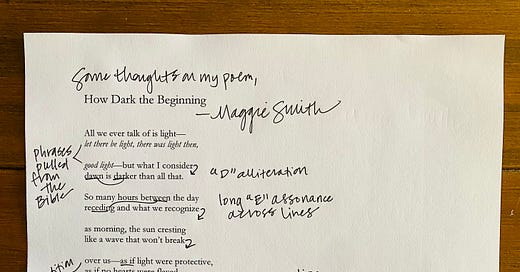Hi, Friend.
This week I’ve annotated “How Dark the Beginning,” from my last collection, Goldenrod. Before this poem appeared in book form in 2021, it was first published in the February 2020 issue of Poetry. Looking at the date now is wild. I had no idea how much I’d need hope—the promise of light—a month later, when lockdown began.
I mentioned in a post to paid subscribers last week that my poems often begin as a scrap of language I can’t get out of my mind. In this case, the opening line came to me first: “All we ever talk of is light.” I kept going with that idea as I drafted, unpacking light as a symbol of hope and new beginnings, and the trope of sunrise in particular. I see the speaker’s initial tone as skeptical. She’s pushing back against all this talk of light, because of course morning doesn’t begin with the sunrise—each new day begins at 12:01am, when it’s still completely dark out and will remain dark for hours. The metaphor was right there: the beginning of a new day is dark.
In the handwritten annotation I’ve noted some of the craft decisions I made related to sound, line breaks, repetition, and word choice. Some of these decisions made the initial draft possible; others came about during revision.
I made final choices about line and sound while sitting at my laptop, reading the poem aloud to myself over and over again, making changes in service of the rhythm, music, and pacing. I revised word choices to play up assonance or slant rhyme (“dragging its shadow” capitalizes on the short A assonance, while the verbs “hauling” or “pulling” wouldn’t do that). I broke the lines in different places to build in pauses where I wanted them. You can listen to audio of me reading the poem here.
In the annotation I marked, with arrows, some turns at line endings that I chose for the sake of tension and suspense. I think of these line endings as suspenseful because the full meaning of the sentence is not yet available to the reader; the reader has questions that they must read on to have answered. Some lines I liked on their own because they have their own integrity and meaning apart from the rest of the sentence. For example, “the sunrise tells us everything” means something on its own, so that line feels charged. When the reader reaches the end of the sentence on the next line—“will be all right”—the meaning changes.
Keep an eye on your inbox this week for a craft tip that will help you get out (and stay out) of ruts with your work, regardless of genre. Paid subscribers will receive one of my favorite revision hacks, too—a go-to strategy that helps me lift up a poem when it’s falling flat. If you’d like to receive that post, and if For Dear Life has been useful for you as a writer or teacher, I hope you’ll consider becoming a paid subscriber.
Either way, I’m glad you’re here.
Happy writing—
Maggie





I find editing myself (especially poems) so challenging (and I spent a career as an editor! 🤦🏼♀️)... your annotations are incredibly fun and insightful. The more I digest them the more I learn. (And “How Dark” is one of my favorites from Goldenrod.)
I love this!